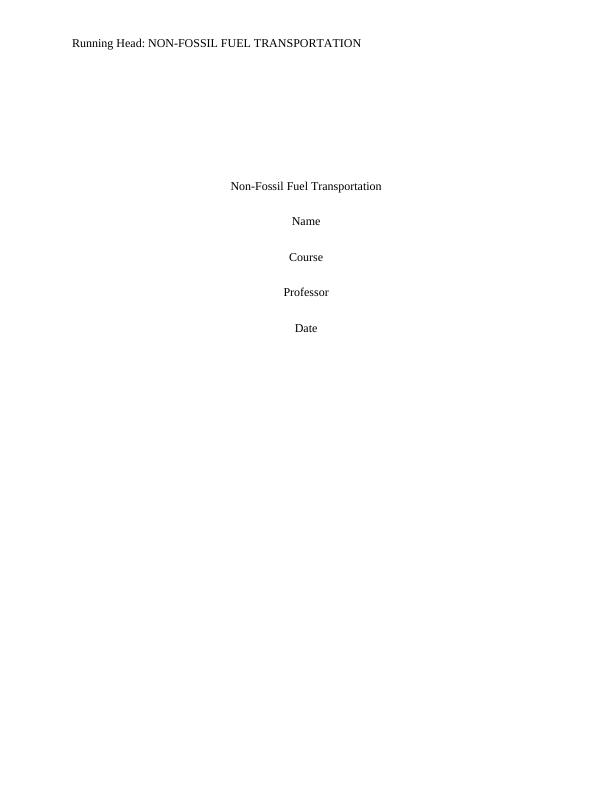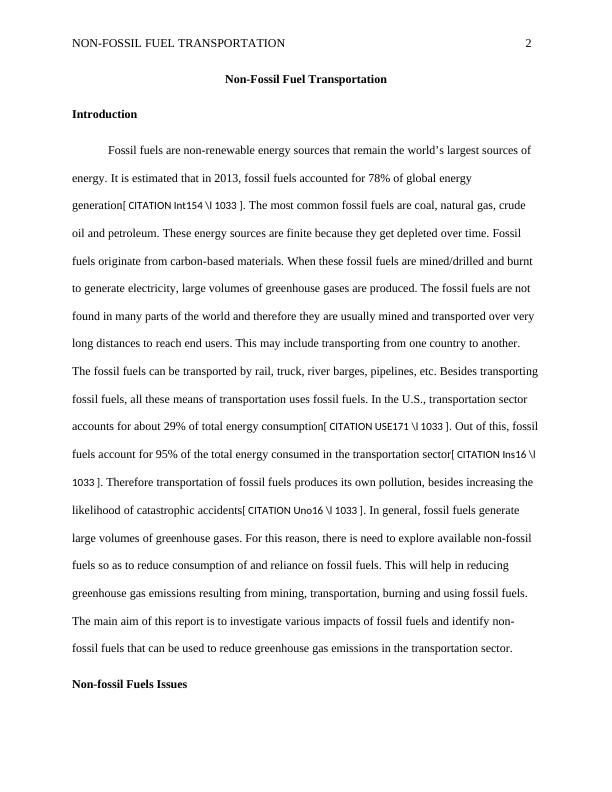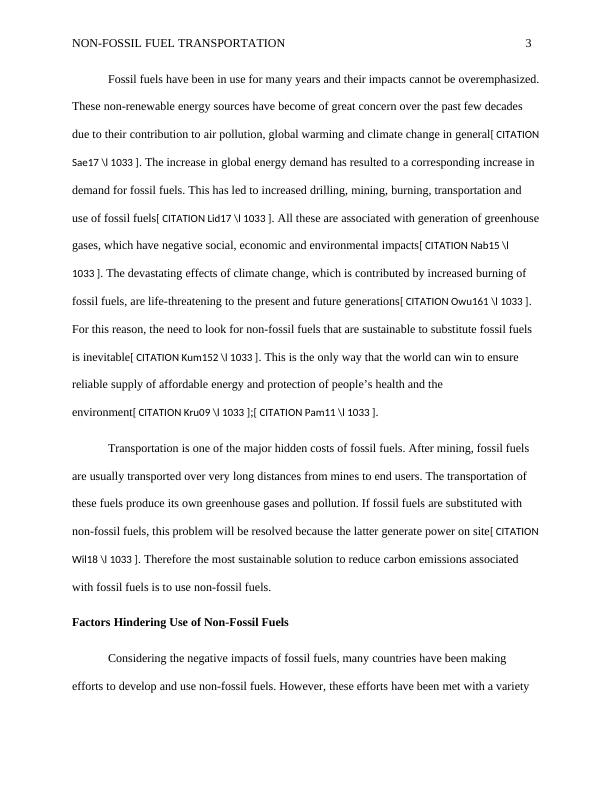Non-Fossil Fuel Transportation
Added on 2021-04-19
9 Pages2576 Words310 Views
Running Head: NON-FOSSIL FUEL TRANSPORTATIONNon-Fossil Fuel TransportationNameCourseProfessorDate

NON-FOSSIL FUEL TRANSPORTATION 2Non-Fossil Fuel TransportationIntroductionFossil fuels are non-renewable energy sources that remain the world’s largest sources of energy. It is estimated that in 2013, fossil fuels accounted for 78% of global energy generation[ CITATION Int154 \l 1033 ]. The most common fossil fuels are coal, natural gas, crude oil and petroleum. These energy sources are finite because they get depleted over time. Fossil fuels originate from carbon-based materials. When these fossil fuels are mined/drilled and burnt to generate electricity, large volumes of greenhouse gases are produced. The fossil fuels are not found in many parts of the world and therefore they are usually mined and transported over very long distances to reach end users. This may include transporting from one country to another. The fossil fuels can be transported by rail, truck, river barges, pipelines, etc. Besides transportingfossil fuels, all these means of transportation uses fossil fuels. In the U.S., transportation sector accounts for about 29% of total energy consumption[ CITATION USE171 \l 1033 ]. Out of this, fossilfuels account for 95% of the total energy consumed in the transportation sector[ CITATION Ins16 \l 1033 ]. Therefore transportation of fossil fuels produces its own pollution, besides increasing the likelihood of catastrophic accidents[ CITATION Uno16 \l 1033 ]. In general, fossil fuels generate large volumes of greenhouse gases. For this reason, there is need to explore available non-fossil fuels so as to reduce consumption of and reliance on fossil fuels. This will help in reducing greenhouse gas emissions resulting from mining, transportation, burning and using fossil fuels.The main aim of this report is to investigate various impacts of fossil fuels and identify non-fossil fuels that can be used to reduce greenhouse gas emissions in the transportation sector. Non-fossil Fuels Issues

NON-FOSSIL FUEL TRANSPORTATION 3Fossil fuels have been in use for many years and their impacts cannot be overemphasized.These non-renewable energy sources have become of great concern over the past few decades due to their contribution to air pollution, global warming and climate change in general[ CITATIONSae17 \l 1033 ]. The increase in global energy demand has resulted to a corresponding increase in demand for fossil fuels. This has led to increased drilling, mining, burning, transportation and use of fossil fuels[ CITATION Lid17 \l 1033 ]. All these are associated with generation of greenhousegases, which have negative social, economic and environmental impacts[ CITATION Nab15 \l 1033 ]. The devastating effects of climate change, which is contributed by increased burning of fossil fuels, are life-threatening to the present and future generations[ CITATION Owu161 \l 1033 ]. For this reason, the need to look for non-fossil fuels that are sustainable to substitute fossil fuels is inevitable[ CITATION Kum152 \l 1033 ]. This is the only way that the world can win to ensure reliable supply of affordable energy and protection of people’s health and the environment[ CITATION Kru09 \l 1033 ];[ CITATION Pam11 \l 1033 ]. Transportation is one of the major hidden costs of fossil fuels. After mining, fossil fuels are usually transported over very long distances from mines to end users. The transportation of these fuels produce its own greenhouse gases and pollution. If fossil fuels are substituted with non-fossil fuels, this problem will be resolved because the latter generate power on site[ CITATIONWil18 \l 1033 ]. Therefore the most sustainable solution to reduce carbon emissions associated with fossil fuels is to use non-fossil fuels. Factors Hindering Use of Non-Fossil Fuels Considering the negative impacts of fossil fuels, many countries have been making efforts to develop and use non-fossil fuels. However, these efforts have been met with a variety

End of preview
Want to access all the pages? Upload your documents or become a member.
Related Documents
Carbon Tax is Best Solution for the Climate Changelg...
|6
|2016
|327
CO2 Emission Reduction Studylg...
|8
|1481
|47
ALTERNATE ENERGY SUBSIDIZATION Assignmentlg...
|6
|1169
|17
RANS Simulation of Laboratory Scale Premixed V-Flamelg...
|27
|5341
|324
Low Impact Manufacturinglg...
|12
|3061
|345
Human Activities and Climate Change Thesis 2022lg...
|7
|1282
|28
